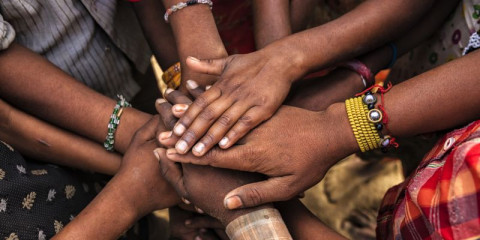
GCED Basic Search Form
Quick Search
أنت هنا
الأخبار

In the rural villages of Maharashtra state in western India where Manisha Gangode lives, girls’ movements are restricted. They are not allowed to roam around or speak to boys. Many young girls are forced, long before they are adults, to marry a boy of her parents’ choosing. However, as part of a project supported by the Asia South Pacific Association for Basic and Adult Education (ASPBAE) and UNESCO Institute for Lifelong Learning, a group of young marginalized girls in villages just like Manisha’s have come to realize that they have the agency to learn, question, and change their worlds. They have become Shodhini.
“Shodhini” is a Sanskrit word meaning female researcher, a title proudly adopted by the young women participating in the Youth-led Action Research (YAR) on girls’ education. In this research process, the young women learned to do many things they had never done before. They conducted a census of the girls in their respective villages and analyzed the results, calculating the percentages of out-of-school girls and child marriages.
The YAR project also triggered action based on the data compiled by the young women. Manisha and her friends presented their reflections and analyses on girls’ education and livelihoods before the village council, lobbying for the construction of a library in the village. They now participate in village council meetings and organize women’s meetings, advocating and providing support for other young marginalized women.
This process of reflection, analysis and action that the Shodhini go through is the very heart of Education for Sustainable Development (ESD) and Global Citizenship Education (GCED), both of which are expressed in Target 7 of the Sustainable Development Goal 4 (SDG 4). Often referred to as SDG 4.7, the target states that we must “by 2030 ensure all learners acquire knowledge and skills needed to promote sustainable development”. ESD and GCED empower us to engage with and transform our society as citizens of our community, our country, and the world. As a crucial part of the SDG 4 on inclusive and equitable quality education and lifelong learning and an enabler of all SDGs, transformative education like ESD and GCED is a key instrument in shaping a sustainable future.
The aspiration of transformative education is highlighted in the upcoming international framework for ESD entitled “Education for Sustainable Development: Towards Achieving the SDGs (ESD for 2030)”. This framework builds upon the lessons learned and experiences of UNESCO’s many years as the lead UN agency in ESD promotion. After the UN Decade of Education for Sustainable Development (2005-2014) and the Global Action Programme (GAP) on ESD (2015-2019), UNESCO will be moving forward with this new framework, which has been endorsed by UNESCO’s Executive Board and will be discussed at UNESCO’s General Conference and the United Nations General Assembly later this year.
ESD for 2030 emphasizes, as the YAR project illustrates, that community is where transformative action for sustainability takes place. In this framework, community is seen as a platform for all sustainability actions and the nodal priority area of action for ESD. In this regard, ESD can be utilized to identify shared values and issues that collectively concern the community.
From this perspective, UNESCO Bangkok has initiated the project “Promoting Community-based Education for Sustainable Development” with the generous support of the Government of Japan. The aim of this project is to enhance capacities of community and non-formal educators to guide learners through the process of taking action for sustainability. With the expertise of many partner organizations, preliminary learning modules were developed to help navigate this reflection to action process. The modules are currently being piloted in five countries: India, Japan, Lao PDR, Mongolia, and the Philippines.
In one of these pilot projects, marginalized farmers and educators in the communities of Karnataka in southern India are looking to change their unsustainable harvesting practices. By drawing on examples from their familiar forest environment and from locally sourced learning materials in their own language, they are able to apply the transformative learning process in contexts that are relevant to them. They can then easily guide others through the same process in order to change their livelihoods for the sustainability of their own communities.
UNESCO Bangkok has been leading the way in bringing these main tenets of ESD—the importance of transformative action and community—to the forefront. Projects such as YAR and the community-based ESD project are particularly pertinent as they are grounded in transformative action at the community level in the context of people’s real lives.
Moving forward, we must continue to work together for the sustainable development of our communities and our world. The Shodhini do not only learn about their own communities, but they also reach out to girls in other villages so that they too can feel empowered to take life into their own hands. Similarly, we must all continue on in our efforts, but of course, we cannot do it alone. Bringing about change is no easy feat, but it is all the more attainable if we, like the Shodhini, come together to take collective action to build a peaceful and sustainable future.
URL:
